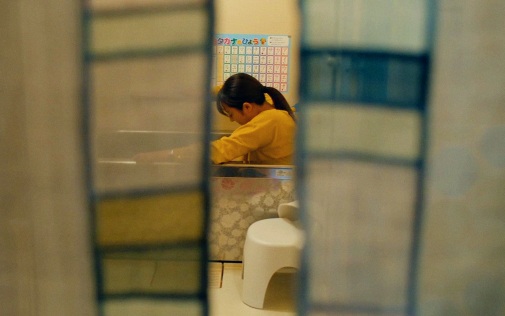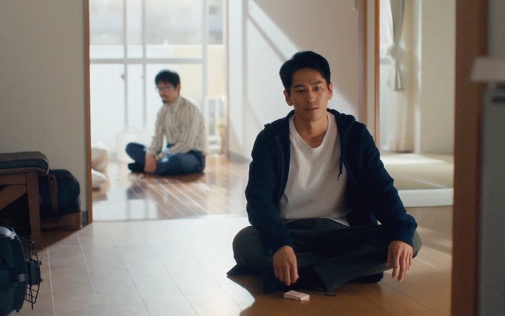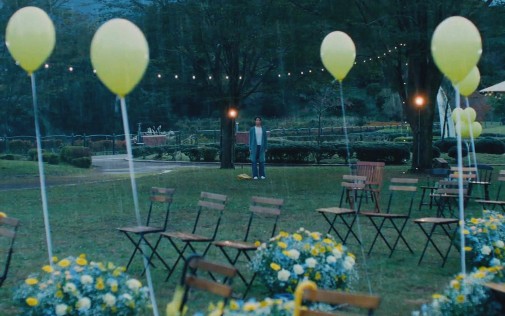Review: "Love Life" Sings a Tragic Song
 Monday, August 14, 2023 at 3:30PM
Monday, August 14, 2023 at 3:30PM 
Under the right circumstances, a whisper can sound like a shout, soft caresses like barb-wire across the skin. In Kôji Fukada's cinema, a directorial style full of quiet oddities becomes the perfect context for such paradoxes to thrive ferociously. They never resolve themselves completely either, a sense of mystery prevailing until the end credits roll, whether it's the perversions of Harmonium or A Girl Missing's puzzle box plot. For his latest film, now in limited release, the Japanese auteur let go of those previous projects' violent spirits, redirecting his attention to a premise that sounds like easy-digestible melodrama. But, of course, that's not what Fukada has in store for his audience
Love Life was reportedly inspired by a romantic tune, but its final song rings barren, no rose-colored loveliness muffling the agony hiding between the notes. The sound produced is no crooning chant but a shattering, the glass of fragile joy broken before the first act is over…

Taeko and Jiro live in apparent idyll, their relationship forged in the wake of disappointment, perchance strengthened by the struggle. From a previous marriage, she has her son Keita, who Jiro hasn't officially adopted but treats as his own child. At least, so it seems, even if the man's parents are less comfortable with the arrangement. His mother, in particular, only seems to accept the state of affairs because she arbors hope that Taeko will one day give her a biological grandchild. Though present, these tensions can't be spoken aloud, simmering steadily under the surface of familial peace. The men bury their feelings in stoicism. The women are muted in dutiful deference.
In some ways, the situation is a powder keg waiting for a spark of ignition. On the day we meet the family, preparing a party to celebrate little Keita's birthday and victory at a board game championship, the scintilla manifests. It's perfectly awful, a sudden accident with no blame to share, no catharsis in sight. However, the results aren't as fiery as one might presume. The dynamite is wet and dormant, sizzling in the absence of a blast. Instead of screaming, the characters appear paralyzed by what happened, their status quo thrown into disarray so great they're like deers in the headlights, bodies frozen as wits try to keep up with the revolutions going on inside.
And that's before Taeko's Korean ex-husband arrives. His entrance marks one of the few times when the melodrama is allowed to roar with open gusto, soon receding back to the complicated quiet the other characters inhabit. Only, the mysterious Park isn't assimilated into their precarious balance, partly due to barriers in communication. Unable to speak, the foreigner depends on Taeko as interpreter, translating his words into spoken Japanese, including when he's trying to find aid for his current houseless condition. Shocked out of her normalcy by more than one upset, the woman falls to insularity next to the figure from her past, the current relationship with Jiro put to the test, up to the fire.

Some would accuse Fukada's characters of behaving oddly in ways unjustified by the narrative, rather prescribed by a directorial affectation. However, once one looks past the subtle stylization, certain human truths emerge within the oddity. Often, it feels like people are too calm and dazed in these pictures, acting out bizarre behaviors while reacting very little to the chaos. I can't help but recognize something sharp in these dynamics, especially as the folk in the director's filmography are caught in situations where extreme emotion feels like a logical endpoint. And yet, they repudiate the open opera by staring troubled at their own heart.
His films a medium point between a microscope and a magic mirror, to watch Fukada's creations is to contemplate people trying to solve the mess of their own hearts. They're knights facing a mutating chimera before them and internally maneuvering through that battle. These people live at odds with themselves, existing in two planes of sentiment. One caustic, immediate, animal and near uncontrollable that's deep within. The other closer to the surface and in constant reaction to the first profound feeling. It makes for a drama that's often ugly and messy, playing in two steps, cacophony transformed a rhapsody of incongruity.

At the same time this dissonance comes, the whole film reaches a strange sense of humanity. It feels rare, verging on precious, a treasure of painful expression constantly teetering on the precipice of disaster. A false step in direction or performance would make the whole exercise fall into the abyss, the film buzzing with risk from minute one right to the finish line. Managing the bizarre tonal alchemies, Fukada proves a master, keeping things malleable to the point uncomfortable comedy can coexist with pulverizing plight. His actors work at the same level of genius, jumping through hoops to make sense of senselessness.
Fumino Kimura is especially formidable. She breathes life into Taeko's serpentine journey of the soul, through grief transcendental, repeated betrayal and a final return, back to before, where nothing will ever be the same. An earth-shaking scene percolates in the memory with particular intensity. There, the actress allows us to see the haunting sight of human smallness succumbing to despair, trying to maintain a fleeting trace of what's forever lost. As if that would assuage the pain. Kento Nagayama and Atom Sunada peel back their roles many layers, unafraid of unseemly dimensions while keeping the men in Taeko's life from becoming simple villains. Every part of the supporting cast deserves applause, an ensemble fearlessly going where few artists are brave enough to tread. In the end, what they achieve feels halfway between a sob and a comfort, strangely reassuring if you're willing to find the hope glistening in the reflections of old CDs.

Are you familiar with Kôji Fukada's cinema? Does Love Life entice you with its tragic tune?
 Asian cinema,
Asian cinema,  Film Review,
Film Review,  Japan,
Japan,  Koji Fukada,
Koji Fukada,  Love Life,
Love Life,  Reviews
Reviews 

